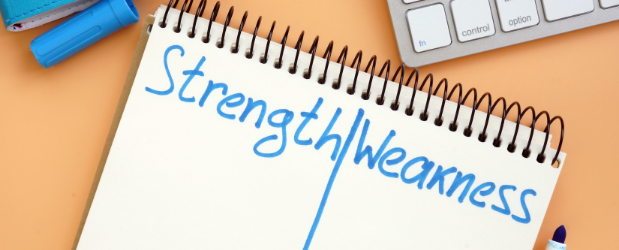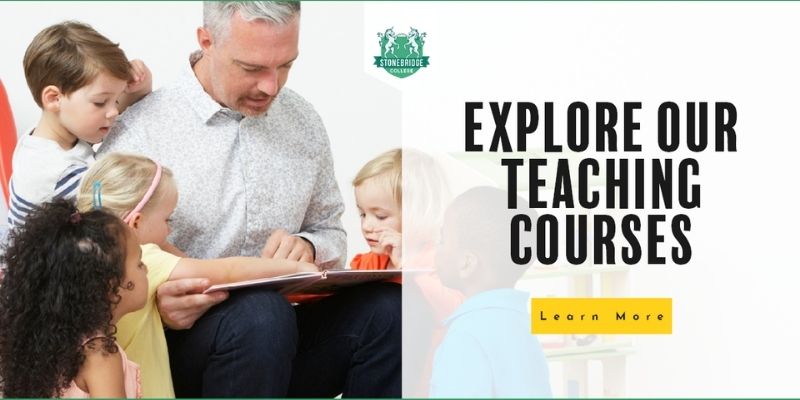
Whatever industry you work in, interviews follow a broadly similar format. The reason for this is simple, it gives hiring managers a good understanding of what you’re like as a person. Ultimately, a CV or a job application will only get you so far. Your potential future employer needs to get a feel for what you would be like to work alongside, and how you would handle stressful situations.
Cultural fit is as important as competence in many roles as any gaps in knowledge can be taught. Teaching is slightly different as competence in the classroom is something you need to have before you start the job. This is why a sample lesson is almost always included in the interview process for teaching jobs.
While you need to demonstrate you can lead a class from the get-go, the hiring manager will know that you’re just starting out and there’s still a lot you will learn along the way. This is why being able to identify your strengths and weaknesses is a relevant question as it demonstrates a level of awareness that is important in a Teacher.
No one is perfect but equally, you need to know what you’re good at, which is quite important when trying to sell yourself during an interview. The topic of strengths and weaknesses often come up in common Teacher interview questions, and if you need help in preparing for such Teacher interview questions, continue reading!
Why Employers Ask About Strengths and Weaknesses
This question can feel like a trap. It’s reasonable to assume that highlighting one’s weaknesses can do you out of a job in the education sector. However, weaknesses are only a problem if you are unaware, unwilling to acknowledge them, or unwilling to do anything about them. Plus, that isn’t why you’re being asked.
To clarify, you’re also not being asked to confess trivial habits like leaving the toilet seat up or drinking milk straight from the bottle. Your weaknesses should be more in line with you as a person. Things like poor time keeping or letting challenging situations bother you.
You should also be prepared to give examples of what you do to offset them. Remember, having weaknesses isn’t a problem, doing nothing about them is.
What Strengths Do I Have as a Teacher?
Similarly, your strengths aren’t ‘eat an entire box of Jaffa Cakes in one sitting’, or the ability to dance the Macarena. Instead, it is things like compassion, the ability to listen or support others. There’s no real wrong answer here, as long as you’re honest and avoid cliches when answering Teacher job interview questions.
For teachers, an understanding of strengths is especially important as you will regularly be called upon to identify them in others, especially those children who lack confidence.
You can identify your strengths by reflecting on your teaching career thus far. Consider the highlights and low points and how you handled those situations. Identify what you learned about yourself from those experiences, whether it’s that you’re calm under pressure or you’re a natural problem solver.

STAR Responses
The STAR interview technique allows you to use stories and anecdotes to effectively illustrate your skills, traits, or experiences that are relevant to the questions you’re being asked. STAR stands for Situation, Task, Action and Result.
Many of the questions you get asked in a Teacher interview will be behavioural in nature so anecdotal evidence is more or less a given. The STAR approach will allow you to structure your answers to fully answer the interview question.
You should also be prepared for follow-up questions that are strength and weakness questions in all but name. This can be asking you when you made a mistake or a moment you were especially proud of.
It can be difficult to think of these things on the fly so have some examples prepared, and yes, it’s perfectly acceptable to have prepared examples written down to refer to. If anything, it helps as it demonstrates your preparedness.
In all cases, the interviewer will be looking for examples of what you learned from the experience – good or bad, because even our strengths can grow or develop into new areas of our career. Demonstrating that wider awareness of yourself and your actions is key.
What are Your Strengths and Weaknesses as a Teacher?
Many people struggle to identify what their strengths and weaknesses are. Mainly because in our society we get a lot of mixed messages about self-promotion, self-compassion, and self-praise. Equally many are all too quick to identify our failings and shortcomings.
This can make it very difficult for us to (a) clearly identify what our strengths and weaknesses are and (b) talk about them without feeling uncomfortable or vulnerable.
Below is a list of example strengths and weaknesses. This is by no means an exhaustive list and purely intended to get you reflecting on your own:
Strengths:
- Technical skills – this could be IT, audio visual or any other area of specialist knowledge
- Creativity – ranging from writing to arts and crafts, creativity takes many forms
- Empathy or kindness – a highly valued trait in teachers, especially in primary settings
- Organisation – a must for teachers, but something you can learn
- Discipline – again, useful for teachers, especially when dealing with spirited individuals
- Fairness – the ability to treat pupils or students fairly, despite opinion, is essential
- Persistence – refusing to give up on your class no matter what
- Collaboration – working well with others, be it leadership or TAs makes a big difference
- Patience – possibly the most essential skill in a Teacher’s arsenal
Weaknesses:
- Lack of technological knowledge (such as a specific software)
- Reliance on routine – inflexibility can cause conflict
- Perfectionism – this can be a tall order especially when dealing with children
- An incomplete understanding of a specific skill – but a willingness to learn is important
- Lack of or too much spontaneity – you need a balanced approach
- Fear of public speaking – not ideal when teaching
- Lack of work-life balance – a hard thing for teachers to maintain
Whatever your strengths and weaknesses, give examples using the STAR methodology, and each time, identify ways that you can improve or what you learned from the experience. Again, it’s not about being perfect, it’s about showing your interviewer that you have that deeper understanding of yourself. It also shows that you’re actively working to improve your strengths and overcome your weaknesses.

How Do I Get to the Interview Stage?
Before you even reach the point where you’re interviewing for a teaching role, you need to get the qualifications behind you. To become a Teacher in England, you will need to gain Qualified Teacher Status (QTS), which is obtained via an Initial Teacher Training (ITT) programme.
You can study such programmes at university or at a school, and upon successful completion, you will be ready to begin your induction year. This is when you will start preparing for Teacher interview questions.
Keep in mind that most Teacher training programmes in England will require you to apply through the Department for Education’s ‘Apply for Teacher training’ service, but there are other routes to consider. The entry requirements for Teacher training include:
- Degree – To get into teaching in England, you will require a degree or equivalent. For aspiring secondary school teachers, you should study a degree subject that is related to the subject you want to teach
- GCSEs – You require at least a grade C/4 or above in GCSE English and Maths to enrol on a training programme. You may also require the equivalent grade in a Science subject, but please do your research beforehand
- Criminal checks – You must declare any previous convictions and undergo a Disclosure and Barring Service (DBS) check
Starting Your Teaching Career from Scratch
Now that you know the entry requirements for Teacher training, you can start gaining the qualifications you need to get there. As mentioned, a degree is a key step in the process to entering the teaching sphere. To enrol on your chosen degree you will need a number of GCSEs, as well as Level 3 qualifications, which can be either:
Which Option is Better for Teaching?
Traditionally, A Levels were the norm for university entry requirements, but if you go back to college, you will likely have to commit to two years of academic study to achieve the qualifications you want. An alternative option is to study your chosen A Levels through Stonebridge Associated Colleges. As long distance learning specialists, we provide a range of online courses, including A Levels.
This means that you can work through the courses from the comfort of your own home! Studying your chosen subjects online enables you to complete the courses faster than learning them in a traditional classroom. However, if you want an even quicker route to university, enrol on an Access to HE Diploma.
What is an Access to Higher Education Diploma?
We have always been led to believe that A Levels are the route to degrees, but that is not the case. An Access to Higher Education Diploma is the equivalent of 3 A Levels and is widely accepted by universities as alternatives to A Levels, but please check with your chosen establishment before applying.
When it comes to a teaching career, particularly primary school teaching, the Access to Higher Education Diploma (Education Professions) course is ideal preparation for degree-level study. You will gain foundational teaching knowledge, which will help you answer common Teacher interview questions in the future.

What is Covered During Your Access Course?
During your studies, you will explore a range of topics that will benefit your journey towards the teaching sector. The modules include:
- Family
- Current Developments in Education
- Child Development Early Socialisation
- Nutrition and Digestion
- Play in the Curriculum
- Numeracy Skills for Primary Education
- The Safe and Ethical Use of Generative Artificial Intelligence
- Perspectives on Education
- Human Reproduction Growth and Development
You will also go on to learn the following modules:
- Equality, Diversity and Inclusion
- Literature: The Novel
- Safeguarding
- Social Interaction
- Working with Children with Additional Need
How is an Access to HE Diploma Assessed?
Unlike most traditional qualifications, you don’t need to pass an exam to achieve an Access to Higher Education Diploma. To complete the course successfully, you will need to complete a series of assignments based on the modules you learn. There will be a range of questions for you to answer, and you will receive tutor support to help you navigate through the course.
With this foundational knowledge, you will be able to progress on to degree-level study and eventually feel confident tackling any interview question that you are faced with when applying for jobs.
Get Prepared!
If you’re considering a career in teaching, we can help. Stonebridge Associated Colleges is a leading UK distance learning provider, delivering a range of learning distance courses across multiple industries.
Our online courses are developed by industry leaders and most are nationally accredited so you can be confident that your qualifications will be recognised by educators and employers alike.
Click below to view our learning distance courses and to find out how you could be ready to start your Teacher training within a year. Alternatively, speak to one of our Course Executives on 0121 392 8288 or contact us online.






Leave a Reply